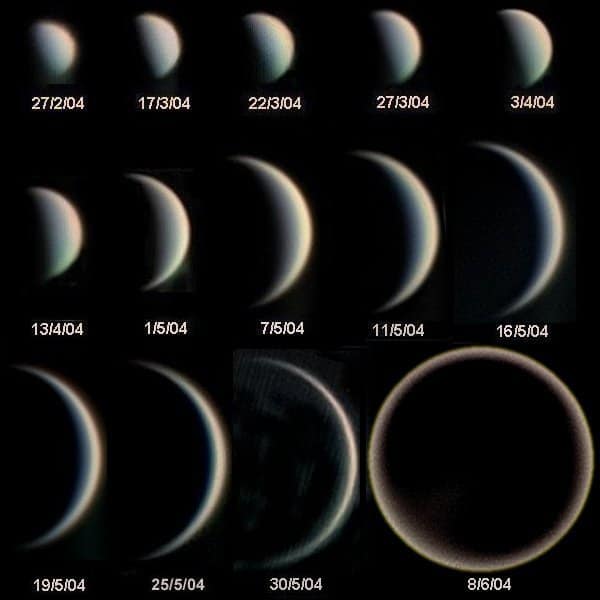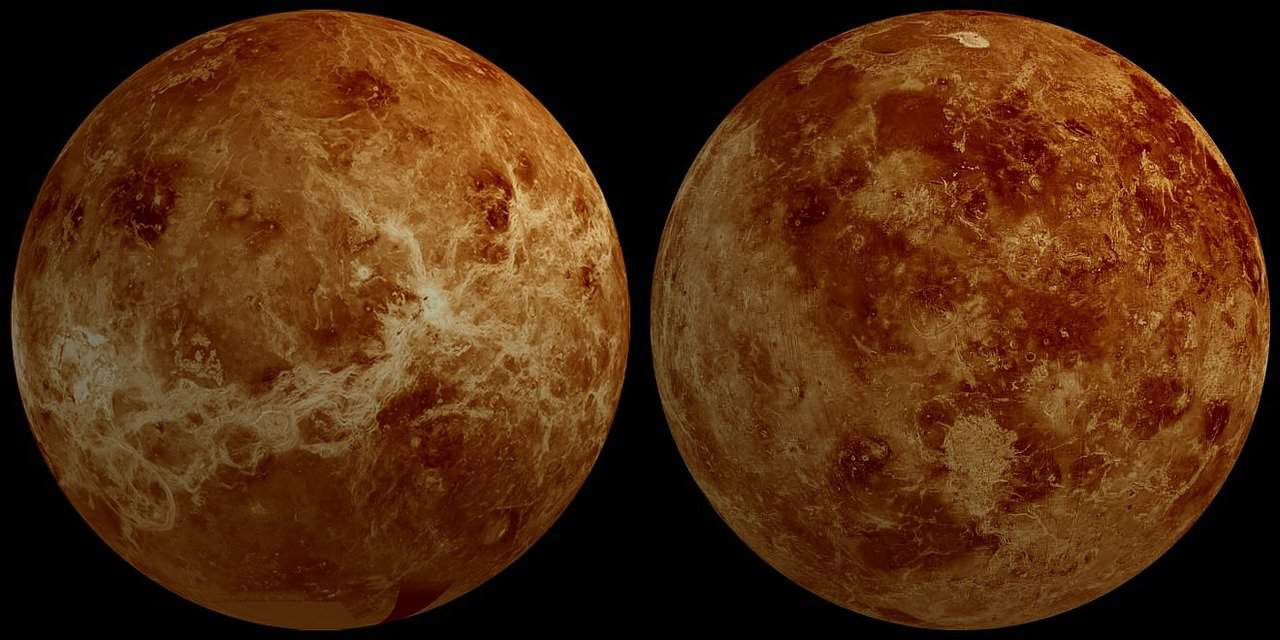
The planet Venus, the second planet in our solar system, is definitely a unique and interesting one. Take a look at these Venus facts and you will know what we mean! Venus may not be the closest planet to the Sun, but it’s definitely the hottest. It’s also the brightest natural object in Earth’s night sky after the Moon.
This hostile planet is home to numerous volcanoes, extreme temperatures, winds, and a dense atmosphere full of toxic gases. Despite its extreme environmental conditions, however, would you believe that some scientists suggest that life can possibly exist on it?
In a startling turn of events, scientists from MIT, Cardiff University, and other institutions have discovered what seem to be signs of life in the clouds of Venus. While no clear evidence of living organisms has been found, if their observation is linked to life, it must be some kind of “aerial” life-form in Venus’ clouds. According to the experts, this is the only habitable part of the planet.
Experts call Venus the Earth’s twin. This is because the two planets are identical in scale, mass, and rocky composition. They have the same type of atmosphere, but that’s where the similarities end. Earth is a habitable planet with temperate oceans and lakes. Meanwhile, Venus’ surface is a scorching hot landscape with temperatures exceeding 900°F and suffocating air.
Want to know more? Join us as we go through 40 fascinating Venus facts. Learn more about Earth’s mysterious sister planet.
- Venus is the second planet from the Sun, coming after Mercury and before Earth.
- Sunlight takes around six minutes to reach Venus.
- It is one of the four terrestrial planets in the solar system, along with Mercury, Earth, and Mars.
- It has an average distance of 67 million miles, 108 million kilometers, or 0.7 astronomical units (AU) away from the Sun.
- The planet revolves around the sun at a speed of 21.76 miles per second or 35.02 kilometers per second.
- Venus is the closest planet in proximity to Earth.
- Humans have been observing the planet since ancient times.
- The planetary motions of Venus have been plotted as early as the 2nd millennium BCE.
- When people refer to things related to Venus, they use the adjectives Venusian, Venerean, Venerian, or rarely, Cytherean.
- Venus has a mean density of 5.243 grams per centimeter cubed or 3.03 oz/in3, 3.03 ounces per cubic inch.
- Its gravity is 8.87 m/s2, about 90 percent of the gravity here on Earth.
- The planet’s escape velocity is 10,360 m/s or 33,900 feet/s.
- It has an axial tilt of just 2.64 degrees, which means it rotates on its axis nearly upright. In contrast, the Earth spins on its axis at a much larger tilt of 23.5 degrees.
- Because of its small axial tilt, the planet Venus does not experience any seasons.
- The planet’s astronomical symbol is a circle with a cross underneath (♀). This symbol is also used in biology to indicate the female sex.
- Next to the Sun and the Moon, the Maya civilization deemed the planet Venus as the most important celestial body. Its movements had an important role in the Mayan calendar.
- Vincent van Gogh painted the planet Venus to the right of the cypress tree in his famous 1889 work, The Starry Night.
- The Chinese call Venus “Jīn-xīng” (金星) or the golden planet. It is associated with the metal element in China, Japan, and Korea.
- In Hindu astrology, the planet Venus influences various aspects of human life such as wealth, pleasure, and reproduction.
- The Old Babylonians called Venus “Ninsi’anna”, which translates to “divine lady, illumination of heaven”.
The planet takes its name from the Roman goddess of love and beauty.
Venus takes its name from the Roman goddess of love and beauty, likely due to the planet’s bright, beautiful, and jewel-like appearance.
After all, it was the brightest among the five planets that ancient astronomers knew about. Aside from Gaia (the alternative name of Earth), Venus is the only planet in the solar system that takes its name from a feminine figure.
Interestingly, the names of most of its surfaces also originate from important women in history and mythology. For example, its northern highland continent has the name Ishtar Terra, while the southern highland continent is Aphrodite Terra. Ishtar is the Babylonian goddess of love, justice, and political power, while Aphrodite is the Greek counterpart of Venus. One volcanic crater on Venus, Sacajawea, takes its name from a Native American woman who guided the exploration of Lewis and Clark.
Many refer to Venus as Earth’s sister planet.
One of the most popular Venus facts is that many people refer to it as Earth’s “sister planet” or “twin planet”. This is due to the fact that it doesn’t differ much from Earth in terms of size and mass. The average radius of Venus is around 3,760.4 miles or 6,051.8 kilometers, which is roughly 95 percent of the Earth’s radius at the equator. Venus’ mass is around 1.073 × 1025 pounds or 4.8675 x 1024 kilograms. This is roughly 81.5 percent of the mass of Earth.

The days on Venus are longer than its years.
Certainly among the most interesting Venus facts is that a day on Venus is longer than a year on the planet. This is because the planet rotates on its axis extremely slowly that it goes around the Sun faster than it spins.
Venus is the slowest rotating planet in our solar system, and it spins at a speed of only 4.05 miles per hour or 6.52 kilometers per hour. In contrast, the Earth spins at speeds of around 1,040.4 miles per hour or 1,674.4 kilometers per hour.
Because of its extremely slow rotation, it has the longest day of any planet as well. Just one day on Venus is equivalent to 243 days on Earth! However, Venus just takes around 225 Earth days to orbit around the Sun (thus completing a Venusian year). Therefore, its days are longer than its years. Weird, right?
Venus is one of the brightest objects in the sky.
If you’ve ever gone stargazing, there’s a chance you might have already seen Venus. That’s because next to the Sun and the Moon, Venus is the brightest natural object in the sky. Venus has an apparent magnitude of −4.92 to −2.98, making it bright enough to cast shadows on Earth.
You can also see the planet without using a telescope. Sometimes, you can even see Venus in broad daylight on a clear day. Because of its brightness, some people mistakenly report it as an unidentified flying object (UFO)! Now that’s certainly one of the Venus facts you can share with your friends.
The ancient Egyptians and Greeks considered Venus as two separate celestial bodies.
Because Venus lies within the orbit of Earth, we can always see it relatively close to the Sun in the sky. When Venus is on one side of the Sun, it trails behind the Sun. It becomes more visible during sunsets.
Every 584 days, however, Venus appears on the other side of the Sun. When it does, it rises in the morning before the Sun does.
Because of the tendency of Venus to appear before sunrise or after sunset, some cultures such as ancient Egypt and ancient Greece view it as two entirely different entities. They see as two distinct “stars”: the morning star and the evening star.
When Venus was visible shortly before sunrise, the ancient Greeks referred to it as the morning star Phosphorus, or the “Bringer of Light”. When it appeared after sunset, however, it was called Hesperos or the “Star Of The Evening”. The ancient Romans already knew that Venus was just a single object, but they still adopted the morning and evening aspects of Venus as Lucifer and Vesper, respectively.
Similar to the Moon, Venus has phases.
In the early 17th century, Italian physicist Galileo Galilei observed Venus with his telescope and discovered that the planet appears in phases similar to the Moon. Like the Moon’s phases, the phases of Venus vary from crescent to gibbous to full and vice versa. It shows its new phase when it’s directly in between the Sun and Earth.
The existence of the phases of Venus would only be possible if Venus orbited the Sun. Because of this, Galileo’s discovery of the phases of Venus served as evidence that the planets revolved around the Sun, not the Earth as some people believed back in the day.

It rotates on its axis in a clockwise direction.
The Earth rotates on its axis in a counterclockwise direction, as do most other planets. However, Venus rotates in the opposite direction, a feature which it shares only with Uranus.
Scientists refer to this as a “retrograde rotation”. Because of the opposite spinning motion of Venus, if you were to stand on its surface, you would see the Sun rising from the west and setting in the east.
The planet has an extremely dense atmosphere.
Despite their apparent similarities, Earth and Venus vary quite a lot. The atmosphere of Venus, for example, is extremely dense and hard to see through. Furthermore, most of the Earth’s atmosphere consists of nitrogen and oxygen, but the dense atmosphere of Venus consists mostly of carbon dioxide.
As much as 96.5% of its atmosphere is carbon dioxide, which is toxic to us humans. Venus also has thick clouds that consist mostly of sulfuric acid.
Because of its dense atmosphere, scientists did not know for a long time what the surface of Venus actually looked like. Its thick clouds also prevent sunlight from hitting the planet’s surface. This means that the ground on Earth receives more sunlight than the ground on Venus despite Earth being farther away from the Sun.
The dense atmosphere of Venus also dampens the impact of projectiles (such as meteorites and asteroids) hitting the surface of the planet. Venus’ atmosphere slows the incoming objects so much that some objects burn up or break down in the atmosphere before reaching the ground. Thus, Venus doesn’t have any impact craters smaller than 1.86 miles or 3 kilometers.
The pressure on Venus is about 90 times that of the Earth’s atmospheric pressure at sea level.
Aside from having a dense atmosphere, Venus is also home to extreme pressures. At the surface of Venus, the pressure is around 1,350 psi or 93 bar. This is roughly 90 times greater than the atmospheric pressure on Earth at sea level. The pressure is also roughly equivalent to the pressure at 3,000 feet or 900 m below the surface of the ocean on Earth. However, its upper atmosphere around 31 to 37 mi or 50 to 65 kilometers above the surface has a much more Earth-like pressure.
Venus has the highest surface temperature of all the planets in our solar system.
Despite the fact that Mercury is much closer to the Sun than Venus, Venus is still the hottest planet in our solar system. The average temperature on the surface of Venus is around 867 °F (or 464 °C or 737 K). In contrast, Mercury is twice as close to the Sun as Venus, but only has a maximum surface temperature of 801 °F (or 427 °C or 700 K).
The extreme temperature on Venus is due to the fact that carbon dioxide makes up most of the Venusian atmosphere. Carbon dioxide is a greenhouse gas that traps heat in the atmosphere and radiates it back to the planet’s surface. Because the atmosphere of Venus is extremely rich in carbon dioxide, it has the strongest greenhouse effect among all the planets in our solar system, and thus also generates the highest surface temperature of all the planets.
It’s also interesting to note that because of the dense atmosphere, the surface temperature of Venus doesn’t differ much between the two hemispheres, as well as between the poles and the planet’s equator.
However, temperatures can vary by altitude, with higher places being cooler than lower ones. Venus’ highest point, Maxwell Montes, is therefore also the coolest point on the planet’s surface.

It has a rather weak magnetic field.
One of the most essential Venus facts is that the magnetic field of Venus is significantly weaker than that of Earth. The Earth mostly generates its own magnetic field, but Venus does not.
Instead, the magnetic field of Venus relies mostly on the interaction between its outer atmosphere and the solar winds that the Sun generates. Because of this weak magnetic field, the planet doesn’t have adequate protection against the harmful radiation from outer space.
Venus experiences some extreme winds.
The winds on the surface of Venus are quite slow, moving just a few miles per hour, but are powerful enough to make it hard for you to walk through because of the dense atmosphere. Above the planet’s clouds, however, the winds move at breakneck speeds. The winds there move at speeds of up to 224 miles per hour or 360 kilometers per hour, about 60 times faster than the speed of the planet’s rotation. In contrast, the fastest winds on Earth just move at around 10 to 20% of Earth’s rotation speed.
Venus was the first planet that humans visited using a spacecraft.
As the closest planet to Earth, Venus was humanity’s first target of interplanetary exploration. Venus served as the first planet outside of Earth that humans observed using spacecraft. Soviet Russia first started missions to explore Venus in 1961 with the Venera program, but they failed on their first attempts to send a spacecraft to the planet.
In 1962, the American space probe Mariner 2 became the first spacecraft to successfully visit Venus. The Mariner 2 mission also became the world’s first successful interplanetary mission. It gathered information regarding the atmosphere of Venus and determined that the planet had cool clouds and an extremely hot surface.
Since 1961, there have been over 40 (and counting) space missions to the planet Venus. Definitely some of the Venus facts that are just out of this world!
The first and only country to land a spacecraft on the surface of Venus was the Soviet Union.
Although NASA’s Mariner 2 space mission was the first to study Venus, it did not enter the planet’s atmosphere or make contact with the surface. It only went as close as 21,607 mi or 34,773 kilometers to Venus and went on to orbit the Sun after its encounter with the planet.
In 1967, Soviet Russia launched the Venera 4 space mission and successfully sent a probe into the atmosphere of Venus. Venera 4 gave scientists a closer look at Venus and determined the composition of its atmosphere. It also showed that the surface temperature on Venus was much hotter than the calculations of Mariner 2.
Soviet Russia’s Venera program, held between 1961 and 1984, successfully landed a total of ten probes on the surface of Venus. They sent thirteen probes into the planet’s atmosphere. Because of the hostile conditions on the planet, however, the probes only maintained contact with Earth for a short period of time.
The longest time that a probe survived on the planet’s surface was just around two hours. Of course, a manned mission like the Moon landings would be impossible to carry out for Venus.
Interestingly, Venus paved a way for early space cooperation as well. Both Soviet and American scientists worked together to analyze data from Venera 4 and Mariner 5.
Venus has the largest number of volcanoes compared to any other planet in the solar system.
For a very long time, everything that happened on the surface of Venus was a big mystery — the planet was notoriously hard to monitor because of its thick clouds and dense atmosphere. It wasn’t until 1975 that the Soviet Venera 9 and 10 missions would show us the first photographs of the planet’s surface in black and white. By 1982, the Venera 13 and 14 landers also gave us colored photographs of the mysterious surface of Venus.
The surface of Venus is rocky and comes in different shades of gray, but due to the thick atmosphere, you would see everything with an orange hue. Flat plains make up two-thirds of the planet’s surface, and tectonic plates are largely absent.
Scientists later found that volcanic activity played a crucial role in shaping much of the surface of the planet. They noted that Venus has a large number of volcanoes — several times as many as Earth does. It is the planet that has the largest number of volcanoes in the solar system, with more than a thousand known volcanic structures on its surface.
Although most of its volcanoes are long extinct, some scientists suggest that the planet is still volcanically active.

We know very little about its internal structure.
Studying the surface of Venus is difficult enough for scientists because of the planet’s extreme environmental conditions, so we likewise know very little about its internal structure. We also don’t have a lot of information regarding its geochemistry.
From its similarity with Earth in size and mass, however, scientists speculate that it has a similar structure as well: with a crust, a mantle, and a core. Its core is likely partially liquid like that of Earth’s.
Its orbit is the most circular among all the planets.
One of the most interesting Venus facts is that it orbits the Sun in a relatively circular pattern, rather than a more elliptical one, like most other planets. Its orbit has an eccentricity of 0.007, which means that it maintains a relatively stable distance from the Sun. The distance between its farthest and nearest points from the Sun is the smallest among all the planets in our solar system.
Venus has no rings and natural satellites.
Aside from Mercury, the only other planet that doesn’t have any rings or moons is none other than Venus. In the 17th century, Italian astronomer Giovanni Cassini reported seeing a moon orbiting Venus and named it Neith.
Several other astronomers also reported observing it, but later scientists found out that these sightings were most likely just stars near Venus’ position.
In a 2006 study about the early solar system, scientists Alex Alemi and David Stevenson suggested that Venus probably had at least one moon billions of years ago. The study also suggested that the same impact that reversed the planet’s spin direction also could have caused the destruction of the Venusian moon. Alternatively, the strong solar tides around Venus and Mercury likely would not have made it possible for natural satellites to stabilize their orbits around the planets.
Many scientists think that Venus once had an Earth-like atmosphere — and possibly had water.
Venus’ harsh conditions now may seem too far from the conditions on our home planet. However, scientists postulate that billions of years ago, the conditions on this hot and hellish planet may have been surprisingly similar to Earth. Scientists at NASA’s Goddard Institute For Space Studies (GISS) developed computer models that suggest that Venus actually had an ocean of liquid water in its early years as a planet.
The leading hypothesis is that Venus formed with similar materials as Earth. However, because it has a weak magnetic field and lies too close to the Sun, cosmic radiation may have evaporated the water on Venus, breaking it down into hydrogen and oxygen. Afterwards, solar winds may have swept away Venus’ hydrogen and carried them off into space.
There have been multiple plans to terraform Venus and potentially make it habitable.
Despite the planet’s harsh environments, humans have long speculated on the possibility of life on Venus. After all, it does have some significant similarities with Earth. However, when humans first sent probes to study the planet in the 1960s, scientists came to realize that the environmental conditions on the planet were far too extreme for life to flourish there. Water-based life such as most of the organisms here on Earth would be unlikely to survive on the planet’s surface.
Still, some scientists still believe that the upper atmosphere of Venus could still host life for extremophilic organisms (such as some bacteria and archaea). Even renowned scientists such as Carl Sagan and Harold J. Morowitz suggested that there might be living bacteria-like organisms on Venus’ thick clouds. To support this speculation, scientists found that the upper atmosphere of Venus had the ingredients necessary for photosynthesis such as carbon dioxide, some water, and plenty of sunlight.
In a 2020 scientific article, some astronomers found phosphine, a gas that was unlikely to occur naturally with the chemical processes in the Venusian atmosphere. One possible source could be living organisms. However, the study raked up a significant amount of controversy. Scientists are still continuing their research on whether life would be possible on Venus. Now that’s one of the Venus facts you mustn’t forget!
Was this page helpful?
Our commitment to delivering trustworthy and engaging content is at the heart of what we do. Each fact on our site is contributed by real users like you, bringing a wealth of diverse insights and information. To ensure the highest standards of accuracy and reliability, our dedicated editors meticulously review each submission. This process guarantees that the facts we share are not only fascinating but also credible. Trust in our commitment to quality and authenticity as you explore and learn with us.
